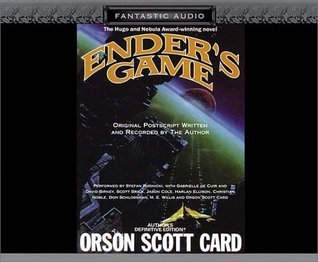What do you think?
Rate this book


Ender's skills make him a leader in school and respected in the Battle Room, where children play at mock battles in zero gravity. Yet growing up in an artificial community of young soldiers Ender suffers greatly from isolation, rivalry from his peers, pressure from the adult teachers, and an unsettling fear of the alien invaders. His psychological battles include loneliness, fear that he is becoming like the cruel brother he remembers, and fanning the flames of devotion to his beloved sister. Back on Earth, Peter and Valentine forge an intellectual alliance and attempt to change the course of history.
This futuristic tale involves aliens, political discourse on the Internet, sophisticated computer games, and an orbiting battle station. Yet the reason it rings true for so many is that it is first and foremost a tale of humanity; a tale of a boy struggling to grow up into someone he can respect while living in an environment stripped of choices. Ender's Game is a must-read book for science fiction lovers, and a key conversion read for their friends who "don't read science fiction."
Ender's Game won both the Hugo and the Nebula the year it came out. Writer Orson Scott Card followed up this honor with the first-time feat of winning both awards again the next year for the sequel, Speaker for the Dead. --Bonnie Bouman
Audio CD
First published January 15, 1985






 come to my blog!
come to my blog!There is no teacher but the enemy. No one but the enemy will tell you what the enemy is going to do. No one but the enemy will ever teach you how to destroy and conquer. Only the enemy shows you where you are weak. Only the enemy tells you where he is strong.
In the moment when I truly understand my enemy, understand him well enough to defeat him, then in that very moment I also love him. I think it’s impossible to really understand somebody, what they want, what they believe, and not love them the way they love themselves. And then, in that very moment when I love them.... I destroy them.